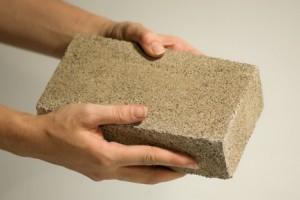>"After most natural disasters, you see mounds of trash and lots of hungry people. Mushrooms could turn that trash into food. A mycologist and mushroom cultivation expert from South Carolina, Tradd Cotter is pursuing an idea that could bring lasting relief to poor communities and victims of natural disasters around the world. Having built a business on growing — and teaching others to grow — mushrooms on just about any waste biomass he could get his hands on, he became painfully aware that these same techniques could be used to both clean up after natural disasters and create meaningful amounts of fast-growing, plant-based protein in a matter of weeks." Continue reading about this great idea and check out the concept video that supports this mushroom concept.
>A British competition chaired by environmentalist investor Richard Branson awarded$669,000 to an American start-up that’s developed an organic, carbon-free process to make bricks. The London-based Postcode Lottery Green Challenge gives an annual award to the best green business idea, and this year’s first-place winner was the firm bioMASON and its founder and CEO, Ginger Krieg Dosier, an architect turned biotechnology entrepreneur.
One of bioMASON's biobricks
Through a process that Dosier compares to the way marine life constructs coral or sea shells, bioMASON uses bacteria to form sand into a crystalline structure that can serve as bricks or a cement-like construction material. The process occurs in a setting similar to a greenhouse, and its only inputs are the bacteria and its food, sand, nitrogen, calcium, and water. As a bonus, the irrigation system for the bacteria is even recycled in a closed-loop set-up, meaning bioMASON’s business model wastes little water.
>"Fort Collins-based Advanced Energy is ready to plug its 1-megawatt solar-energy inverter into a new $135 million facility at the National Renewable Energy Laboratory and see what happens."
"The inverter is a big piece of equipment, and we don't have the capital to do a full-scale simulation," said Mike Dooley, Advanced Energy's vice president for marketing. "This is a perfect private-public partnership."
"The 185,000-square-foot facility is designed to analyze the impact of renewable and distributed energy sources and electric vehicles on the grid.
The indoor and outdoor test areas are also linked to Peregrine, a new supercomputer, which is housed in the facility. "
>Pandas at the Memphis Zoo may be contributing to their upkeep soon thanks to research from the Mississippi State University. This week, scientists presented research at the 246th National Meeting & Exposition of the American Chemical Society (ACS), where they claimed that biofuels could be made from panda poo microbes instead of corn.
House S
>House S is a modern home built in the style of typical barns throughout Bavaria, but with a decidedly new-fangled twist. Shutters on both floors can slide back and forth to control the amount of sunlight that enters the house and to shield it against wind and snow. The low energy house by Becker Architekten is also built with locally-sourced materials.
>Solar panels are the next granite countertops: an amenity for new homes that's becoming a standard option for buyers in U.S. markets.At least six of 10 largest U.S. homebuilders led by KB Home include the photovoltaic devices in new construction, according to supplier SunPower Corp. (SPWR) Two California towns are mandating installations, and demand for the systems that generate electricity at home will jump 56 percent nationwide this year,according to the Solar Energy Industries Association.
"You're going to see a transition from novelty, to granite countertops, to mainstream option," Tom Werner, CEO of San Jose, California-based SunPower, said in an interview. "We're rapidly passing the equivalent of a‘countertops decision' to a ‘no-brainer.' You just do it."
>"Sustainability pioneers do not rest on their laurels. They consistently and passionately work toward long-term improvement, and they are powerful examples of persistent boldness and conviction, particularly when the going gets tough.
That's just one of the findings from a Weinreb Group report, "Pioneers of Sustainability: Lessons from the Trailblazers," released Wednesday. Co-author James Epstein-Reeves and I (Ellen Weinreb) interviewed six sustainability pioneers about their insights, early stories and advice. These six pioneers came to us through a two-step process. First, 52 pioneers were nominated by chief sustainability officers (CSOs) recognized in CSO Back Story, and then 79 sustainability professionals voted to identify our final six."
>"The Clinic is an experiential learning program (Harvard Law School Food Law and Policy Clinic) in which law students are able to engage in practical, hands-on training working with real world clients to impact food laws and policies.
Our work on expiration dates started as a project addressing the needs of our client, Doug Rauch, who was looking to start a new model of food store that would sell food that was still good but might otherwise go to waste. After conducting some research for him on all of the state laws regarding food expiration date labeling, we realized that the system was in major need of an overhaul and we thought this was a great way to use the clinic’s energies. This is an area where the legal system, rather than improving a social issue, is actually at fault for creating more food waste and reduced consumer safety."




